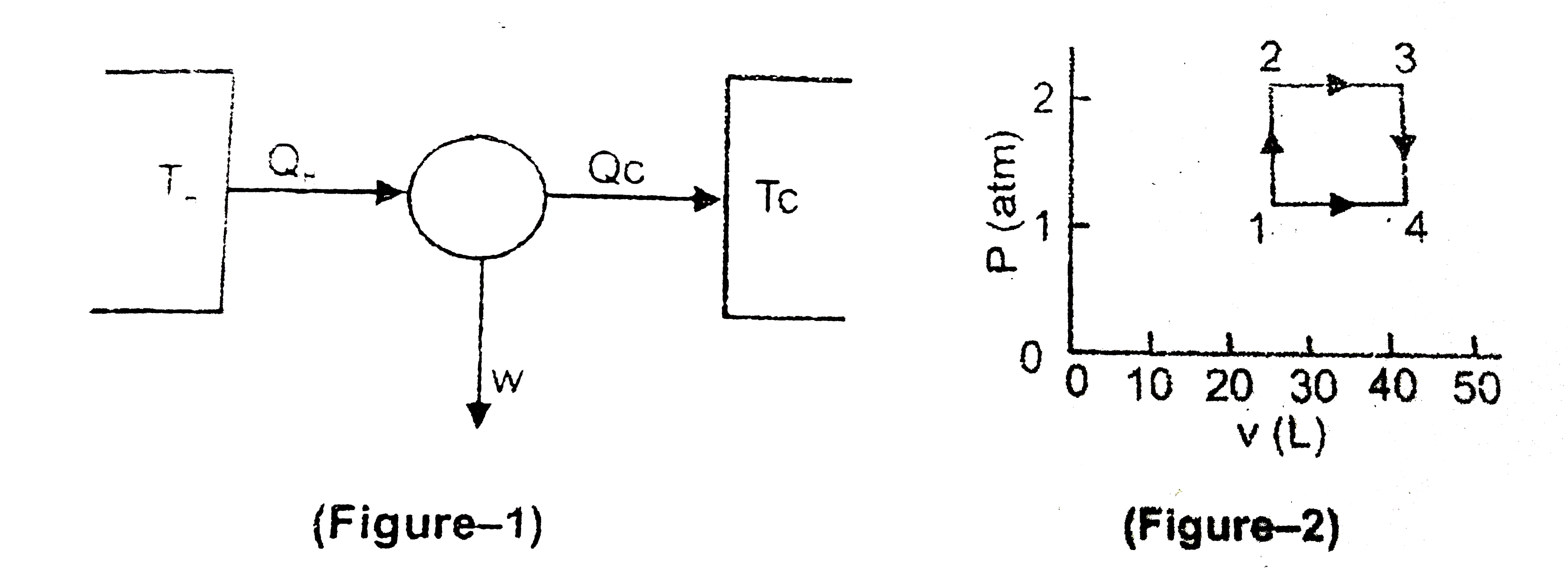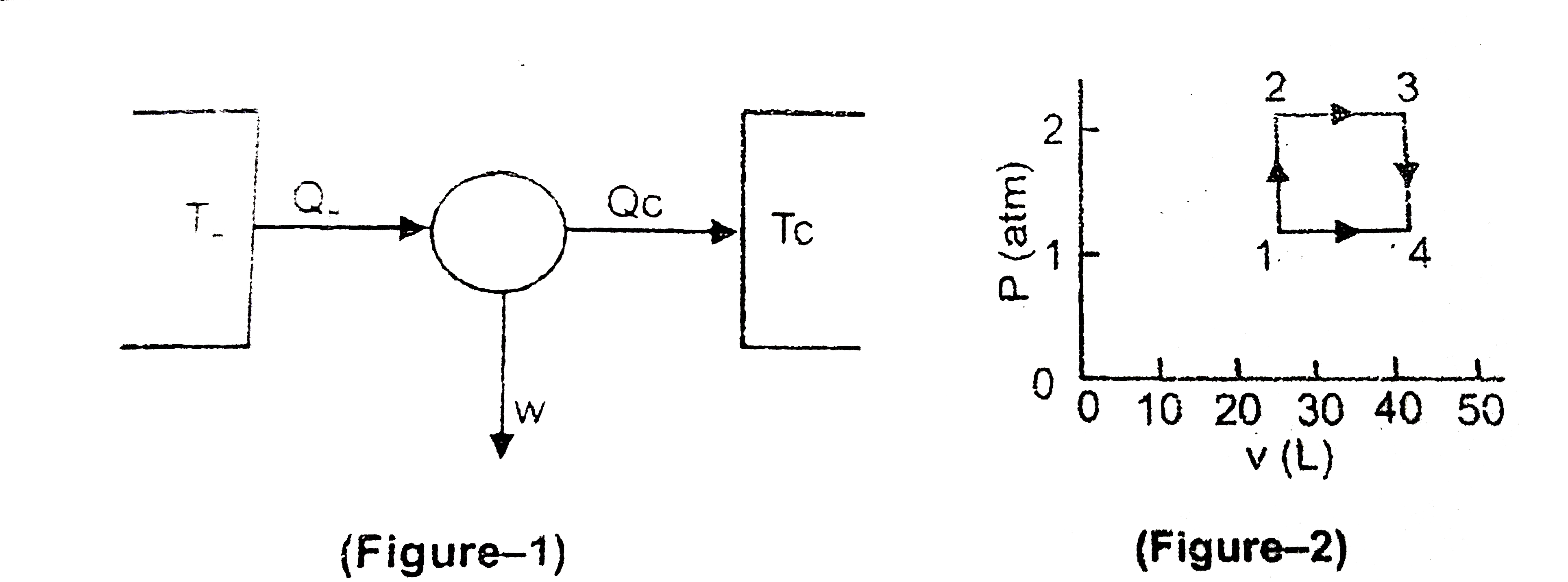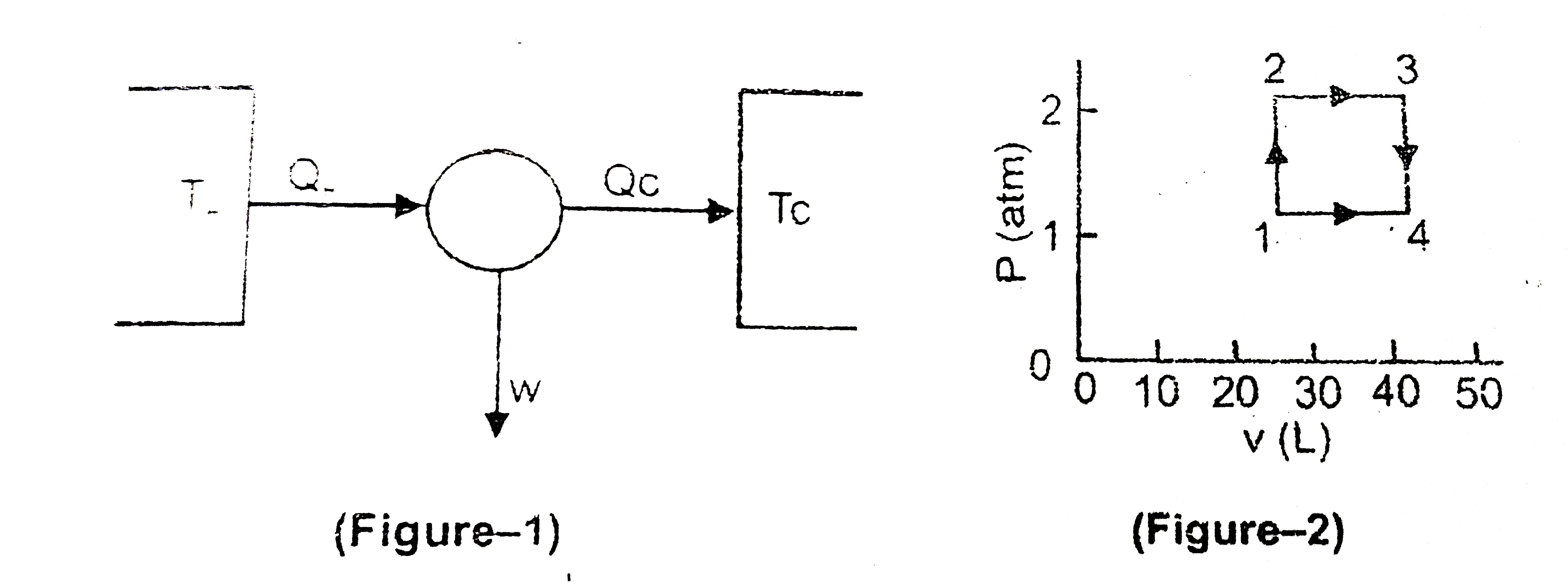A heat engine is a system that converts heat into mechanical work. A heat "source" generates thermal energy that brings a working substance to a high temperature. The working substance then generates work in the engine while transferring heat to a sink at a lower temperature . The working of a heat engine is shownn figure 1.
 Heat engines can be modelled using themodynamic cycles. The heat engine given in Figure -2 is of a working substance which is 1.00 mol of a monoatomic ideal gas . The thermodynamic cycle begins at the point designated as '1' and goes clockwise and the values of P and l or V at each point is as given below Fig-2 (P1=1.00atmandV1=24.6L,P2=2.00atm,V3=49.2L,P4=1.00atm)
Heat engines can be modelled using themodynamic cycles. The heat engine given in Figure -2 is of a working substance which is 1.00 mol of a monoatomic ideal gas . The thermodynamic cycle begins at the point designated as '1' and goes clockwise and the values of P and l or V at each point is as given below Fig-2 (P1=1.00atmandV1=24.6L,P2=2.00atm,V3=49.2L,P4=1.00atm)
Calculate the efficiency of the cycle given in figure 2.
Another system completes a cycle consistings of six quasi-static steps, during which the total work done by the system is 100J During step 1 the system absorbs 300J of heat form a reservior at 300K , during step 3 the system absorbs 200J of heat from a reservior at 400K, and during step5 it abosrbs heat from a reservior at temperature T3 steps 2,4,6 are adiabatic such that the temperature of one reservoir changes to that of next.
The correct Answer is:The efficiency of the cycle is given by : ≈15%
Another system completes a cycle consisting of six quasi - static steps , during which the total work done by the systjme is 100J During step 1 the system absorbs 300 J of heat form a reservoir at 300K , during step 3 the system absorbs 200J of heat from a reservoir at 400 K, and during step 5 it absorbs heat from a reservior at temperature T3 Steps 2,3,6 are adiabatic such that the temperature of one reservoir changes to that of next.
Topper's Solved these Questions
Similar Questions
A heat engine is a system that converts heat into mechanical work. A heat "source" generates thermal energy that brings a working substance to a high temperature. The working substance then generates work in the engine while transferring heat to a sink at a lower temperature . The working of a heat engine is shownn figure 1.
 Heat engines can be modelled using themodynamic cycles. The heat engine given in Figure -2 is of a working substance which is 1.00 mol of a monoatomic ideal gas . The thermodynamic cycle begins at the point designated as '1' and goes clockwise and the values of P and l or V at each point is as given below Fig-2 (P1=1.00atm and V1=24.6L,P2=2.00atm,V3=49.2L,P4=1.00atm)
Heat engines can be modelled using themodynamic cycles. The heat engine given in Figure -2 is of a working substance which is 1.00 mol of a monoatomic ideal gas . The thermodynamic cycle begins at the point designated as '1' and goes clockwise and the values of P and l or V at each point is as given below Fig-2 (P1=1.00atm and V1=24.6L,P2=2.00atm,V3=49.2L,P4=1.00atm)
Calculate T1,T2,T3andT4
View SolutionA heat engine is a system that converts heat into mechanical work. A heat "source" generates thermal energy that brings a working substance to a high temperature. The working substance then generates work in the engine while transferring heat to a sink at a lower temperature . The working of a heat engine is shownn figure 1.
 Heat engines can be modelled using themodynamic cycles. The heat engine given in Figure -2 is of a working substance which is 1.00 mol of a monoatomic ideal gas . The thermodynamic cycle begins at the point designated as '1' and goes clockwise and the values of P and l or V at each point is as given below Fig-2 (P1=1.00atm and V1=24.6L,P2=2.00atm,V3=49.2L,P4=1.00atm)
Heat engines can be modelled using themodynamic cycles. The heat engine given in Figure -2 is of a working substance which is 1.00 mol of a monoatomic ideal gas . The thermodynamic cycle begins at the point designated as '1' and goes clockwise and the values of P and l or V at each point is as given below Fig-2 (P1=1.00atm and V1=24.6L,P2=2.00atm,V3=49.2L,P4=1.00atm)
Calculate T1,T2,T3andT4
View Solution
Knowledge Check
In a heat engine, the temperature of the working substance at the end of the cycle is
Aequal to that at the beginningBmore than that at the beginningCless than that at the beginningDdetermined by the amount of heat rejected to the sink.A heat enegine works on a carnot cycle with a heat sink at a temperature of 2700K. The efficiency of the engine 10%. Determine the temperature of heat source.
AT=3000KBT=300KCT=1000KDT=30000K
A heat engine is a system that converts heat into mechanical work. A heat "source" generates thermal energy that brings a working substance to a high temperature. The working substance then generates work in the engine while transferring heat to a sink at a lower temperature . The working of a heat engine is shownn figure 1.
 Heat engines can be modelled using themodynamic cycles. The heat engine given in Figure -2 is of a working substance which is 1.00 mol of a monoatomic ideal gas . The thermodynamic cycle begins at the point designated as '1' and goes clockwise and the values of P and l or V at each point is as given below Fig-2 (P1=1.00atmandV1=24.6L,P2=2.00atm,V3=49.2L,P4=1.00atm)
Heat engines can be modelled using themodynamic cycles. The heat engine given in Figure -2 is of a working substance which is 1.00 mol of a monoatomic ideal gas . The thermodynamic cycle begins at the point designated as '1' and goes clockwise and the values of P and l or V at each point is as given below Fig-2 (P1=1.00atmandV1=24.6L,P2=2.00atm,V3=49.2L,P4=1.00atm)
(a) What is the entropy change of the system for the complete cycle?
(b) If the cycle is reversible , what is the temperature T3?
View SolutionA heat engine is a system that converts heat into mechanical work. A heat "source" generates thermal energy that brings a working substance to a high temperature. The working substance then generates work in the engine while transferring heat to a sink at a lower temperature . The working of a heat engine is shownn figure 1.
 Heat engines can be modelled using themodynamic cycles. The heat engine given in Figure -2 is of a working substance which is 1.00 mol of a monoatomic ideal gas . The thermodynamic cycle begins at the point designated as '1' and goes clockwise and the values of P and l or V at each point is as given below Fig-2 (P1=1.00atmandV1=24.6L,P2=2.00atm,V3=49.2L,P4=1.00atm) Calculate ΔE for the paths
Heat engines can be modelled using themodynamic cycles. The heat engine given in Figure -2 is of a working substance which is 1.00 mol of a monoatomic ideal gas . The thermodynamic cycle begins at the point designated as '1' and goes clockwise and the values of P and l or V at each point is as given below Fig-2 (P1=1.00atmandV1=24.6L,P2=2.00atm,V3=49.2L,P4=1.00atm) Calculate ΔE for the paths
(i)2→2 (ii)2→3 (iii)3→4 (iv)4→1
The heal engine depicted in this problem is a 'camot heat engine' and the themodynamic cycleof operations of this engine is known as a 'camot cycle' named after Saudi camot , an engine cum thermodynamist . The efficiency of a camot engine as (1−T1/T2) where T1 and T2 are the temperature of the sink and the source.
View SolutionA heat engine works between temperatures 300K and 600K .The efficiency of the engine can be ?
View SolutionCan a heat engine convert 10J of heat into 10J of work ? Justify
View SolutionA heat engine works between source and sink temperatures 150°C and 30°C respectively.The efficiency of heat engine may be
View SolutionA heat engine works between source and sink temperatures 150°C and 30°C respectively.The efficiency of heat engine may be
View Solution
